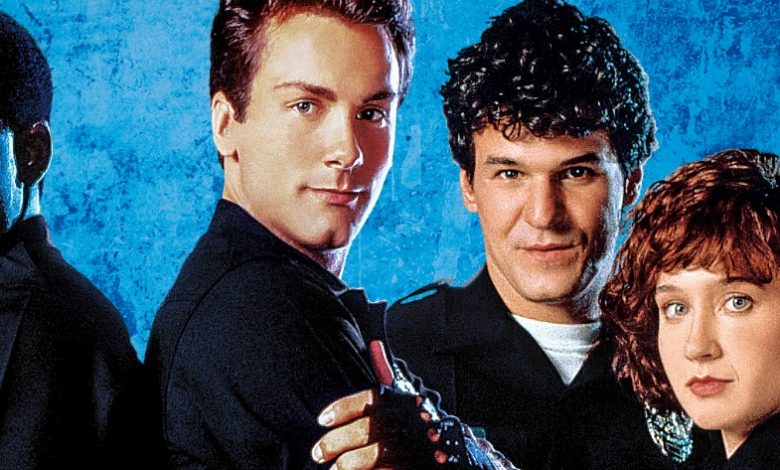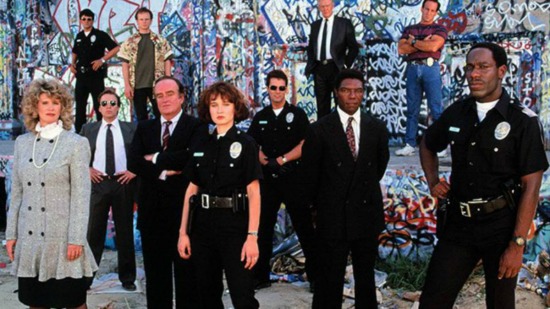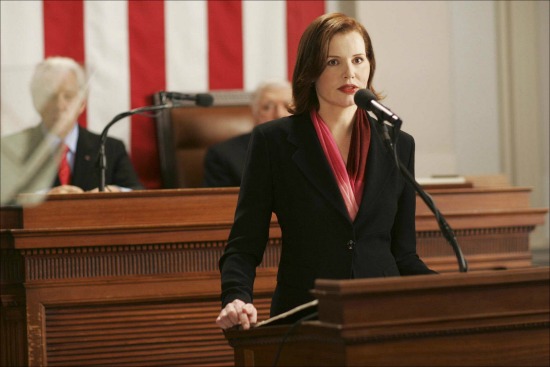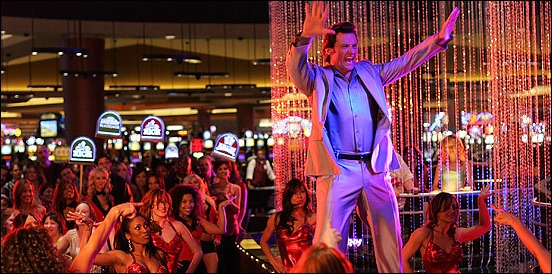Why You Should Revisit ‘Cop Rock’ Debacle

In addition to westerns, audiences couldn’t get enough of movies where characters burst into song, declaring their passion through singing and dancing. In the Golden Age of Cinema, stars like Esther Williams, Gene Kelly, Bing Crosby, Fred Astaire and Ginger Rogers sang and danced their way through one cinematic dream after another.
By the 1970s, movie musicals became too ubiquitous, too expensive and less than stellar. For every “Grease,” there was a “Can’t Stop the Music,” “Xanadu” or “Grease 2.”
With the exception of “The Best Little Whorehouse in Texas” and “Little Shop of Horrors,” there were no successful movie musicals in the 1980s.
I Want My MTV!
Instead of traditional song and dance movies, MTV created a genre of musicals driven by songs, not singing. Out went “My Fair Lady.” In came “Flashdance” and “Dirty Dancing.” The genre became a rarity on the film scene by the early 1990s, when the monetary disaster of “Newsies,” an expensive Disney musical, temporarily halted the genre.
On television, however, things got interesting.
In 1990, two TV shows premiered that utilized the musical format. One was the instantly forgotten “Hull High,” a pre-“High School Musical” program with hip hop and radio-friendly numbers trying to tap into the MTV generation. The other was Steven Bochco’s “Cop Rock,” which instantly became one of the most legendary TV shows that ever aired.
“Cop Rock: The Complete Series” premiered on ABC during the same season as the groundbreaking “Twin Peaks.” The latter would forever alter the television landscape. Whereas David Lynch’s “Twin Peaks” made television more outwardly cinematic, risk-taking and surrealistic, Bochco’s “Cop Rock” was aiming for the same quality.
The pilot provides ample examples of how ambitious and audacious the show strived to be. It also reveals why those attributes resulted in a failure.
The pre-title credit opening sequence depicts police cars roaring to a criminal hideout. The officers bust down the door, pull a drug-addled woman away from her baby and arrest angry criminals. The cinematography is crisp and polished, the execution intense.
The problems begin once the cops drag the criminals outside. The two men under arrest (one of them is Glen Plummer, the guy from “Speed” who gives Keanu Reeves a ride to the bus) begin rapping. Music accompanies them and the concept reveals itself: this is a hard-hitting police procedural musical drama.
The composers for each episode varied, but the pilot featured no less than five songs by award winning composer Randy Newman. A peppy opening credits sequence features Newman rocking out to the main theme, “Under The Gun,” while the cast hangs out with him in the recording studio, acting all chummy.
It’s very strange, and the show continues in this anything-goes fashion.
Among the main characters are a mayor (played by Barbara Bossom) obsessed with her appearance, a young police officer (Anne Bobby) married to a much older colleague and a corrupt cop (Peter Onorati) whose behavior puts him at odds with his partner.
There’s also Paul McCrane, who played the literally melting sociopath in “RoboCop,” and erstwhile Ghostbuster Ernie Hudson, who is replaced by Vondie-Curtis Hall after the pilot.
‘RoboCop’ Rock Reunion
Ronny Cox, McCrane’s “RoboCop” co-star, plays the police chief who has a wacky, pop-up shooting gallery in his office closet. The pilot closes with a memorably wrenching scene where a junkie mom sells her baby and continues to sing a lullaby as the car drives the child away.
Bobby is a striking actress and deservedly was top billed on the show. Her character, an innocent who presses against a tarnished system, is the show’s most compelling.
“Cop Rock” came out the same year Bobby’s starring role in Clive Barker’s “Nightbreed” was edited down to an aimless supporting turn (interestingly, her big musical number was removed from the theatrical cut).
Thankfully, Scream Factory and Shout Factory have released both “Nightbreed” and “Cop Rock on Blu-ray,” reinstating some of Bobby’s strongest, long-unseen work.
Whenever the show plays like a straight forward badge n’ consequences drama, it works well. It’s the interruption of the musical numbers that consistently shoots the series in the foot.
From the first episode on, viewers must endure cops singing lengthy ballads in sustained, single-take shots, African-Americans and Hispanic actors rapping as stereotypical gang members and scenes in the mayor’s office that play like bad outtakes from “The Best Little Whorehouse in Texas.”
‘Cop Rock’ Tease
In the months leading up to its premiere, ABC showcased a single musical number in the televised previews. A tense courtroom overseeing a murder trial becomes a soulful gospel choir, with the jury box singing, “He’s Guiiiiiiiiilty!”
The convicted man sings an enthusiastic rebuttal: “I was abused as a child!” This sequence was admittedly striking in 1990 but plays like high camp today. So does most of “Cop Rock.”
Only a television show producer as powerful and prolific as Bochco could have gotten away with a show so overtly experimental and genre-busting. Prior to “Cop Rock,” Bochco expanded the dramatic grounds of televised crime fighter drama with “Hill Street Blues,” ’80s blockbuster “L.A. Law,” and the superb John Ritter-starring “Hooperman.”
Post-“Cop Rock,” Bochco gave us “Doogie Howser, M.D.,” the boundary-pushing, Mariel Hemingway-led “Civil Wars,” the still-terrific “Murder One” and the essential “NYPD Blue,” to name a few. He was also an executive producer on “Commander in Chief,” in which Geena Davis starred as the first woman president.
if Hillary Clinton is elected in the fall, a reevaluation of that series is all but guaranteed.
Gradually, the so-bad-its-good appeal of “Cop Rock” fades and it becomes an endurance test. The third episode opens with Cox’s chief of police singing a slow, old fashioned cowboy song. That’s fine. Cox is a great actor, has a nice voice and is known to be a gifted singer/songwriter.
However, the sequence takes it one step further. We see Cox dressed in Will Rogers cowboy attire, riding a horse through the empty streets of L.A., singing lyrics like “yippee-ty-yai-yay.”
It’s as cringe inducing as it sounds.
Why ‘Cop Rock’ Flopped
The biggest problem with the series? It never establishes a consistent approach to its musical numbers. Are they meant to be taken literally? Or are they fantasies that spring from the minds of the characters? Is the show momentarily changing genres or are we viewing an alternate universe where everyone in Los Angeles breaks out into song?
The show never makes a firm decision but juggles all of the above.
An indecision of what kind of musical this is makes Cox’s cowboy number especially problematic; we see people on the streets of different ages and ethnicities nodding in approval as he “mosies” on down the asphalt on horseback.
Is this a dream? If not, wouldn’t someone shoot the chief of police as he rides out in the open, belting out a cornball cowboy song?
Why Some Musicals Soar
Dennis Potter’s remarkable British musicals, “The Singing Detective” and “Pennies From Heaven,” which were both remade as American films, featured similarly offbeat, disconnected musical numbers.
Characters in Potter’s films would break out in song, though the sequences were clearly designed to express imagined fantasies. In some cases, the songs are lip synched from old recordings, making the effect even more strange. It’s still a thoughtful example of how our singing can be an attempt to mimic the songs we know and love.
Lars Von Triers’ controversial 2000 Palm D’or winner, “Dancer in the Dark,” had a similar, if even wilder approach to its genre. Shot by a hand-held, hi-def camera, the first musical number featuring Bjork doesn’t occur until an hour in.
By the time Bjork’s unusual first song is introduced, most audience members have likely forgotten they were watching a musical. The effect is challenging, but synergistic to Potter in that it beautifully connects the audience to the mindset of Bjork’s character.
Bochco’s series attempted to blend the movie musical approaches of Bob Fosse, Potter and Von Triers, resulting in a mash-up of presentation that is both unsettling and unwise. “Cop Rock” works well as a series whenever the actors aren’t singing.
Otherwise, even with its thin characterizations, the show could have gone the distance. As is, each episode is involving but shoots itself in the foot whenever a musical number pops up. The ratings declined as quickly as the show itself.
A legendary fiasco was born.
Going Out in Style
The last scene of the final episode is a nudge-nudge, wink-wink tribute to itself. The cast sings together on stage, out of character. A concluding touch that solidifies the show’s status as a one-of-a-kind failure: the grand finale, a song touting “It Ain’t Over ’til the Fat Lady Sings,” features the appearance of a heavy-set singer, adorned in a purple glitter dress, sitting on a swing that’s been lowered from the rafters. Yikes.
The long overdue Blu-ray release of “Cop Rock” by Shout Factory presents every episode in the boxy aspect ratio that reflects American TV sets before flat screens. The extras are superb, starting with an engaging text commentary, loaded with show history, cast info and a wide knowledge of the so-called “Bochco-verse.”
A lengthy, candid interview with Bochco is the best of the bonus features. Bochco explains the show’s origins, as he came up with the idea when someone suggested turning his “Hill Street Blues” into a Broadway musical.
“Instead of bringing Broadway to a cop show, I decided to bring the cop show to Broadway,” he says.
Bochco unapologetically admits the show was a “disaster” but still holds a genuine fondness for the giant artistic risk he took.
Bobby also gives a passionate, thorough interview, pointing out how the show’s subject matter (police brutality, racism, ageism, corruption in the department) was slightly ahead of its time.
The Movie Musical Lives!
The musical genre triumphantly returned to cinema in the late 1990s-early 21st century. Thanks largely to interest in Madonna’s “Evita,” the popularity of Baz Luhrman’s “Moulin Rougue!” and Best Picture Oscar winner “Chicago,” musicals are back, even if their quality and success rate is hit and miss.
“Cop Rock” is an intriguing footnote to the genre, as it presents a wild vision of what musicals can do and ultimately what they should never do. While it’s easy to point to “Glee” as an example of how a musical hybrid can work on TV, its also worth noting that, in 2007, “Viva Laughlin,” a televised musical drama headlined by Melanie Griffith and Hugh Jackman, failed after takeoff.
It seems the integration of an ongoing narrative and knowing when to insert musical interludes still eludes some show writers.
If you’ve read this far and/or are a closet “Cop Rock” fan or find yourself intrigued by a show this crazy, I recommend picking up “Cop Rock: The Complete Series.” For better or worse, you’ve never seen anything like this before. My descriptions don’t do justice to how outrageous the musical numbers are.
With “Cop Rock,” seeing is believing.




In regards to Bochco’s career, I would also mention that he also produced “Over There”, a great Iraq war drama that was sadly cancelled after one season. It was appropriately dark and intense, considering the conflict it was covering, but without getting political or making any preachy anti-war statements.